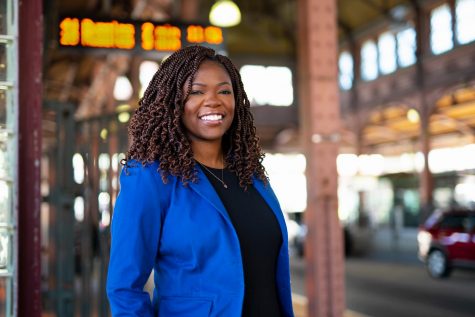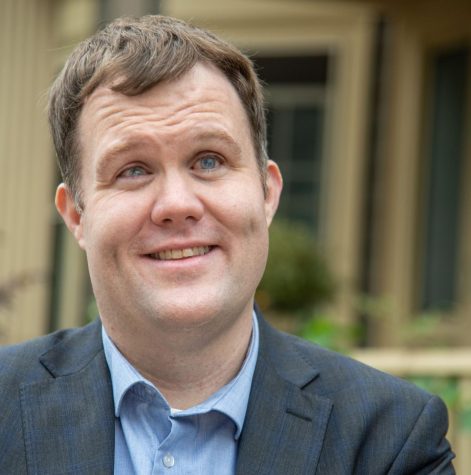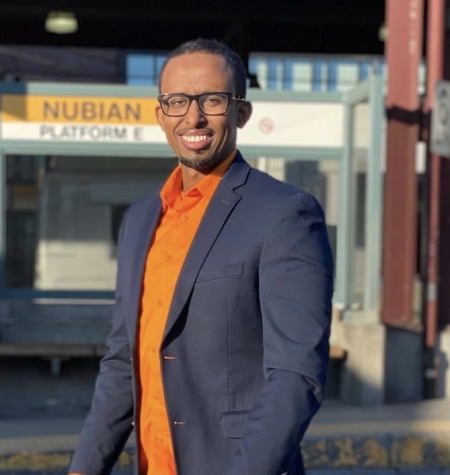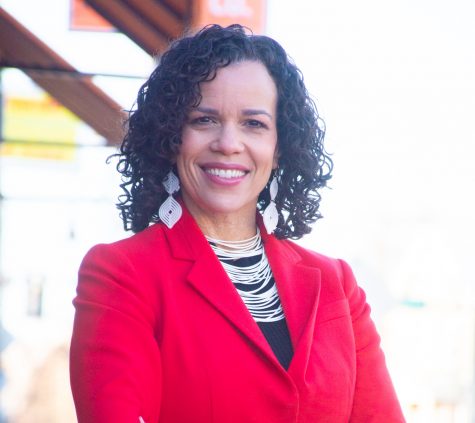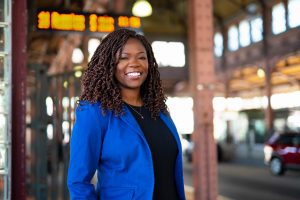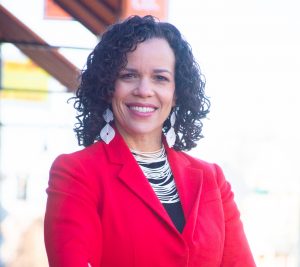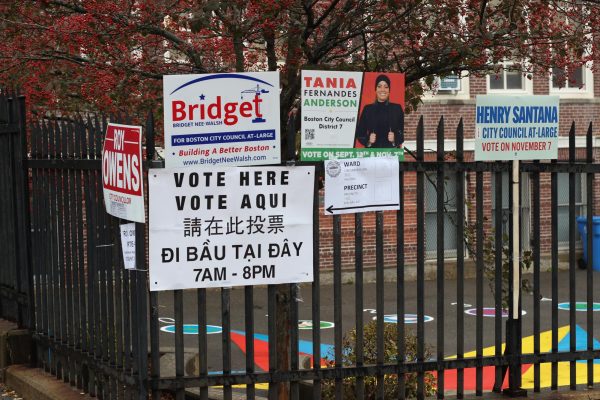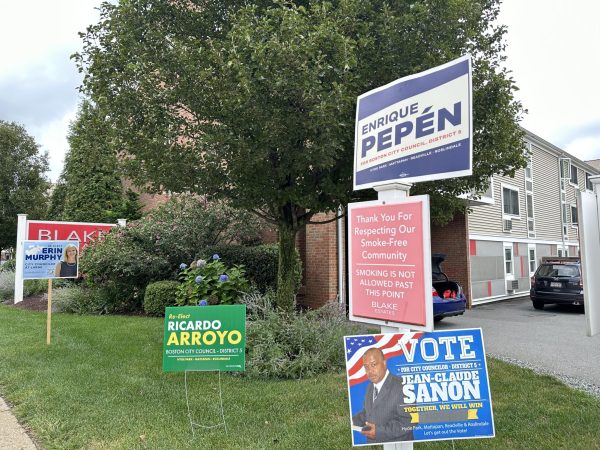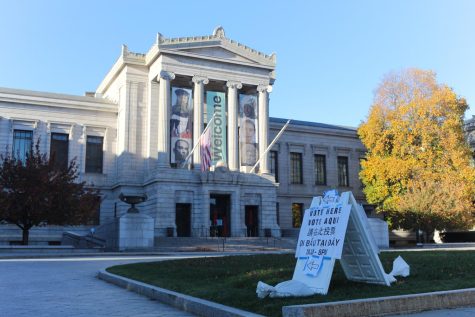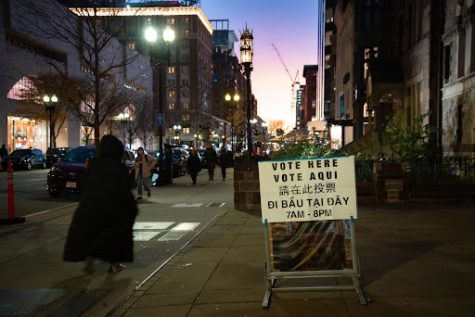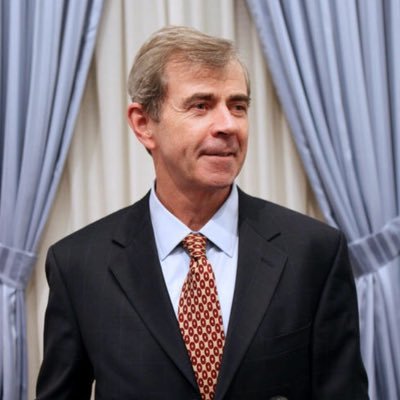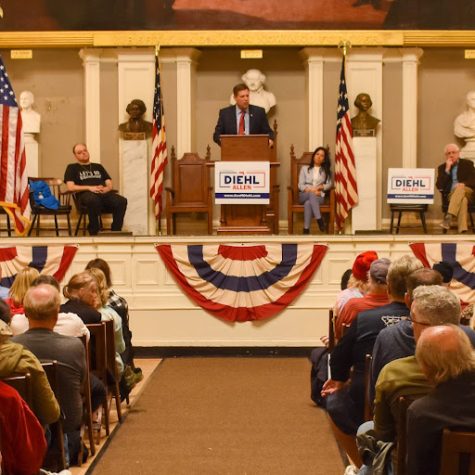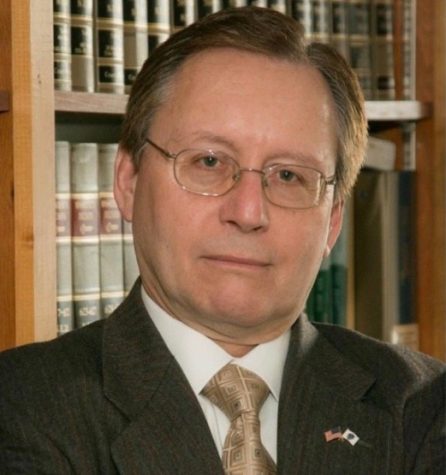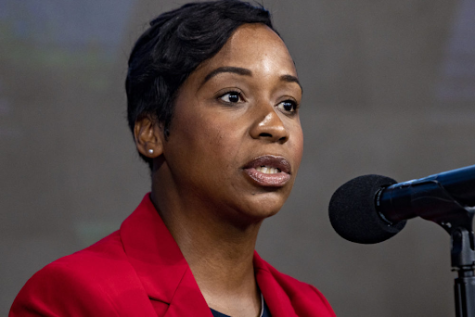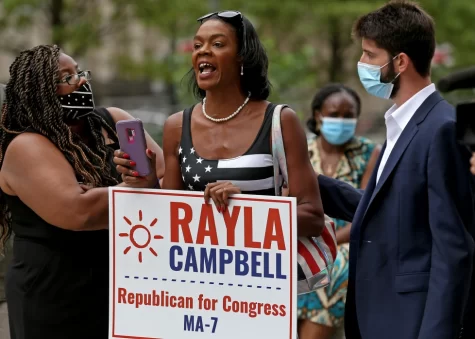City council race: Joao DePina running for District 7
Joao DePina, owner of J.D. Florist and longtime member of the Ward 12 Democratic Committee, is running to represent District 7 in the City Council.
DePina is running against Tania Fernandes Anderson, Santiago “Leon” Rivera, Angelina “Angie” Camacho, Marisa Luse, Lorraine Payne Wheeler and Brandy Brooks. The incumbent Councilor Kim Janey, who was also council president, is running for mayor of Boston while currently serving as the Acting Mayor after former Mayor Marty Walsh was selected to be a part of President Biden’s cabinet as the Labor secretary earlier this year.
As a young boy, DePina and his family immigrated from Cape Verde and settled in Roxbury. He is a graduate of English High School and holds an associate’s degree in biological science from Roxbury Community College.
DePina’s community activism began in the early 2000s after hearing about the death Malik Andrade-Percival in Dorchester. The incident was enough to spark a change in DePina, along with a mentor who gave him a job and pushed him toward the community work that he does today, including advocacy against senseless violence.
Surviving a homicide that took his brother’s life in 2014 also propelled him to lead in trauma-response work by providing mental health resources, volunteering and leading support groups for those affected by violence in his community.
This is DePina’s second time running for office; he previously ran for District 7 in 2017.
The Scope spoke with DePina about the top issues identified by his campaign team and his plans to address them if elected as a City Councilor. Parts of this interview have been edited for length and clarity.
Can you tell our readers more about yourself and why you’re running for City Council?
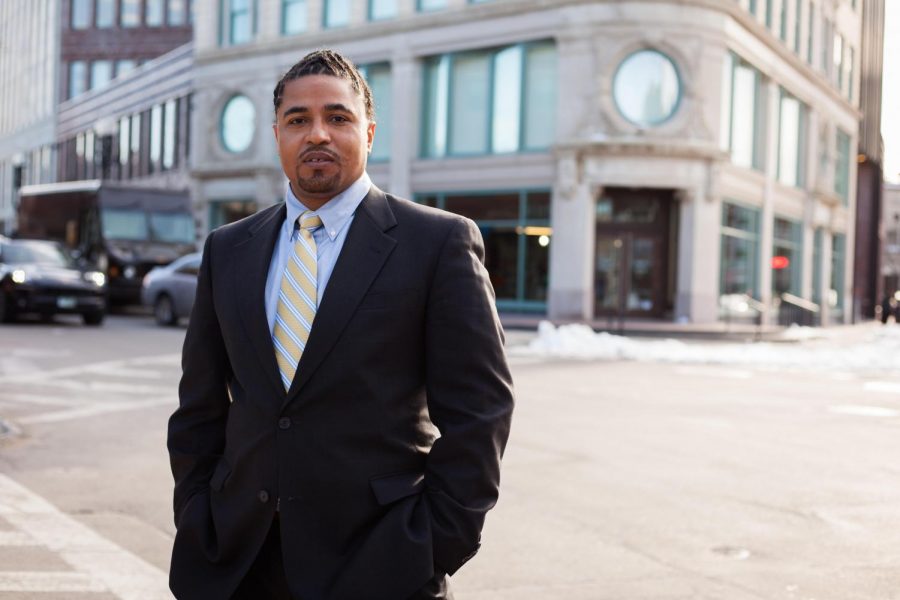
I want the readers to know that I have been advocating for the community for over 20 years. I’ve been advocating for the communities around the issues that directly impact us.
I’ve taken the time to educate myself around many issues. I’m not one of those people that are just going in to look for a position of power. I genuinely want our community to get help and to be represented.
Right now, I find that even within the District itself, there are so many disparities on one side versus the other side. I want to advocate for those issues. I’m not here to make a whole bunch of promises to any of my constituents or any of my fellow neighbors…to tell them that I’m going to do this or I’m going to do that when I know it’s not capable of being done.
I’ve worked on several campaigns, and many times the candidates will say they have this plan, not realizing that they have not worked in City Hall. They have never walked in the halls of City Hall…the majority of them…so they don’t know what it is like and how policy is pushed through. I understand that. That part of our city government that happens in City Hall is not how most candidates think it will be. I want to advocate to let people know that I’m their voice. I am the advocate for those issues that we face. I can’t make you promises that I can’t keep.
I will advocate for the issues that we face and the issues that the constituents bring up to my office or City Councilors At-Large that should bring the issue to the District Councilor, but that doesn’t usually happen because of the relationships in City Hall.
I don’t care to be recognized for anything. I just want the work to be done. I want the readers to know that I’m their voice. I’m going to listen to all of them before getting on that stand and making decisions. I won’t make decisions based on my thoughts, feelings, and nor any religious thoughts or feelings. I want to make decisions based on what the community has given me, the residents of District 7.
I also want people to know that I also play different roles. I am one of those people that I have different layers to me. I have my own platform, and I have my professional layer and then I have my activism layer. I just want people to understand that all of those things are separated, and I keep them all separate… like I keep my activism separate, I keep my business separate and I keep my professional and other committees separate from my entertainment platform.
What would you say are the most important policies on your platform?
My major stuff right now, because of COVID and everything we’ve gone through, is the economic development of the District and ensuring that the residents of District 7 are provided with resources and] services to be able to get back into the workforce—post COVID—and ensuring that small businesses and all other businesses in my District are back to, somewhat, normalcy. I want them to be able to get back to as normal as possible and to be able to take my residents back into the workforce.
I have a list of things under that economic development part, which is providing educational assistance to small business owners. I want them to get assistance and understand how to ensure that they have all the paperwork they need for their business in line. I [have a] small business run out of my house, and [there were] certain things that I wasn’t aware that needed to be filed with the state for the businesses and all that. I learned that all those post-COVID. I want to ensure that all the small businesses and Districts are educated around those things.
I want to make sure that small businesses, minority-owned businesses and women-owned businesses receive their fair share of funding from loan programs. I want to lower business setup costs because there’s so many different costs to opening a small business right now. I want to see how we can alleviate some of the fees or lower some of these fees to make small businesses have space to make it financially.
I’m in favor of gradually and carefully increasing minimum wage. I’m one of those people that understand the future, and I look into what happens on the other side, not just at the moment.
Right now, we’re all concerned about raising minimum wage, but we’re not looking at the effects of raising the minimum wage and the downsides of raising minimum wage and the increase in costs when we talk about revenue. When we increase the wage, we increase the cost of living and increase the cost of goods. When we increase the cost of goods and living, we end up back in the same boat that we are in.
I want to gradually, and I want to carefully increase it to ensure that we’re not going to increase in everything along with it. Right now, we’re already having that problem with the cost of food.
Then, I want to connect job seekers with programs and nonprofits that hold these programs accountable for their performances. That means to make sure that they are doing the job if they’re going to get any government or city funding. I want to make sure that they are held accountable for what they promised to do.
Public safety is another one of my biggest platforms in our community. In public safety, I am not in favor of defunding the police. That’s one big thing for me. I’m not against the Boston Police Department. Well, I am against bad behaviors at the Boston Police Department, and I want to fix that.
I’m for a new police commissioner outside of the jurisdiction, preferably outside the state. Preferably, I would like to see a person of color, whether it’s male or female, but I want them from outside the state.
I want more diverse hiring in the police department, hiring officers who live in Boston’s local community. When we have all these people that come from outside of Boston, that don’t understand Boston, that comes to govern the people of Boston, it becomes an issue because they don’t understand the culture of Boston.
It’s a whole different world from what they grew up in the little suburbs, you know. Making sure that officers are provided with equal opportunities to be able to pass these exams and can move up the ladder; provide training for community policing and making sure that police officers are circling the community and driving within the community [and not] parking in the streets instead of parking in the police station and not doing their job. We need to support more police walking the beat in the community than having them on bikes.
I want to just turn internal affairs into a different entity that is out of Boston police hands. I want it to be more community member-led, and, perhaps, state police and maybe federally-led to do proper investigations on the police, not police themselves.
I know from experience with internal affairs how it goes. I want that to change because I think that’s a major problem. I want to provide mental health support to all officers and ensure that all officers are getting proper services. I don’t think that what they have in place right now is sufficient.
A lot of police officers are witnessing major trauma. And with that trauma, when they go back to work, it affects their ability to work with civilians, depending on what the trauma is, and their outlook on things is different.
I can’t imagine walking up and seeing a scene of a bloody mess or a child being killed or something like that and being able just to go back to work the next day and not function, and function perfectly and not have an attitude with civilians. Therefore, I want to make sure that mental health is provided to the police officers and anyone working within the department involved in any trauma-based cases.
[We should also] provide gun-related education programs to the youth. We need to educate our youth about what guns are and what they do.
I also don’t support having police officers in all schools. I don’t support them in all schools, but I believe that some high schools need them. That’s where we do have the major issues. If we’re in the younger age groups, you know, kindergarten and middle school, I feel like we need to make it more of a happy presence, instead of them just guarding them all the time, but now I do have to say, even middle school children now get involved in a lot of things, as well.
That’s a touchy issue for me, but I’m more so leaning to say, ‘No, I don’t want them in there, but with the stipulation that some schools do need them for the protection of the students, even.’
I also believe that we need to have the police department solve more of these murders and shootings because where they are alleviating some of those issues, in solving those issues, you’re getting the people that are the ones that are shooting off the streets. It makes things better because most of the crime that goes on in Boston is mostly retaliatory.
I am a survivor of homicide. My brother was killed in 2014, and that keeps me going. My cousin, Andre Stoner, was killed, and my cousin, Nicholas Copeland. I’ve had several friends…These are all people close to me that were murdered in the streets of Boston, and it’s propelled me to continue fighting for victims of homicide. We really need to solve some of these murders and give families some peace.
One of the major things for me in my platform is mental health. Because I feel like mental health brings all the issues out with crime, drugs, homelessness, sexual abuse, sexual assault… all those things are under mental health. Having been a victim of rape and molestation, I understand a lot more than the average person. Also, having been a victim of physical abuse, I understand that too, and mental abuse, I understand as well.
The [city and state needs] to build more mental health facilities that can evaluate and provide lock facilities for those who don’t want to get treatment but need treatment.
I understand a lot about those facilities and a lot about mental health. I grew up in the Department of Child and Family Children Services myself, and I’ve been bounced around to many different places and homes. I think that’s another thing I didn’t say in my intro… that I was raised in the Department of Child and Family Children Services.
I understand the significance of those places. I want to have mental health services and homes for these people who are mentally ill. We have [some places], but I feel the city needs to work with the state to build a large facility with a rehab or detox, a day rehab program, a lock facility program and several beds just for mental health services. It will be an all-in-one service. If someone needs to come because they’re on drugs…the first part is they go to the detox, and then we get them into a short-term bed where we’re working with them to figure out the mental health status. Then, if we need to, we should have a mental health unit upstairs [that] provides more housing, where it’s like a three-month process. They can stay up there for three months until we find them stable housing, and the stable housing would look like…well…we need to figure out if this person needs to be in supervised housing. We have shelters, but we also need to make sure that when we build this type of facility that it’s servicing the people of Boston. We can service other people [from outside of Boston], but we need to service the people who are [here].
Right now, our mental health services and all our resources around drug use are going to many people that don’t live in our city [but all around] Massachusetts. I want people in the city of Boston, all of us as City Councilors and the Mayor, to work with the state to ensure that all these other little towns have somewhat of a facility to service their own people.
Boston can’t continue to take the brunt of all these other cities and [have] all our resources going into all these people who aren’t paying taxes or have families living outside of Boston. Everybody needs to be able to build a new facility, and Long Island Bridge needs to open. Long Island was a big resource. If we use a ferry service to bring the people over to Long Island, [it] will be perfect.
I also think we need to work with state legislation to make laws that allow Boston police and other entities and mental health providers, hospitals, doctors, and even guardians… a mother, father or child of the person to be able to Section 12 these people without major hassles.
I [would] look over the current laws and see what amendments we can make. I want to make it easier for a family member or a guardian who can feel that a person is in danger to themselves or endangering the family, and they need to be sectioned. And another part of it…when they overdose, and they get services for being from the city or anything that has to come in revive them, and they have to go to hospital… they should automatically get sectioned to rehab. Right now, we’re giving it too much of a choice.
We’re giving too much of a choice to the point where we’re willing to build a location for them to go and inject themselves, and I’m against the injection centers. I don’t feel like we should provide a space for anyone to go and inject an illegal drug that we already know is illegal.
Right now, there are no more charges of possession of heroin going into the system; but you can get possession of crack, though. I think they’re bending the rules away too much to fit the needs of these…there’s a lot of entitled children that become a drug addict, and you know their mothers and fathers are lawyers and judges running the state. Now the laws are being bent over to provide them services.
I really think that mental health is one of the biggest pieces of this. The only way to combat that is to make it mandatory that these people get to rehab. Yeah,
And then housing. Housing is a big issue. And it goes under everything I just said to you about mental health, because [for] some of these people, the mental health has caused them to be homeless. We need to extend the eviction moratorium for at least three more months, or maybe through the rest of the year. But, [we need to] also provide wraparound services for landlords in trouble with their mortgage.
I want to ensure that those services are provided to help landlords pay mortgages if they’re having a hard time due to job loss or their tenants not paying their rent. I also want to hold tenants accountable when they need to for skipping their rent. I don’t want to make it seem that tenants should just get away with not paying their rent when they have resources to pay their rent. I want to rework the AMI to restructure the income level of Boston.
I support having more affordable housing and ownership, but no more low-income in District 7. I support senior housing. I don’t mind, but we do have a lot of senior housing in District. I don’t mind maybe one more in District7, I think we’re going to get that already coming, but I support that we put more senior housing and some low-income [housing] on the waterfront.
I don’t feel like the waterfront should just be accessible only to the rich. So, therefore, putting a senior housing building there should be great. Why shouldn’t the seniors be able to live there too? I think we should put a senior housing and somewhat low-income building, and I don’t think we should mix all. What I don’t agree with is mixing all low-income in one building. I think we need to mix low-income throughout the city in different places. Because what I find is if you mix some low-income families with some other families that are established and work and can teach these other families, I think it is more of a learning curve than sticking all low-income in one building. I believe that what builds the crime when [you stick all low-income in one area].
That’s where Boston’s biggest problem is that we saturate one area with low-income and all the other people on the other side…so it feels very segregated. I think that’s also part of the problem because everybody’s in one area. Everybody’s trying to thrive for one thing… jealousy and everything else comes from it.
I don’t support rent control. There are many other ways to go around it than to make people who work hard for their stuff have to control their rent. I don’t want to impose that on landlords. We need to figure out other ways, and I think AMI and whatnot should give us a different outlook.
I want to reduce housing and development fees. I feel like some developers right now, especially small developers, that want to build, that have more of a mindset of helping the community, often it becomes they don’t help the community because of the fees and what they have to do before breaking ground.
I want to look at the city fees and other things that these developers are paying. I want to help them navigate some of it so that the housing cost is not as much. Ultimately, the cost of the housing goes on the cost of construction. If we’re able to lower some of those costs, they should give us more low-income units or more affordable units. Right now, it’s only 13%, but if we can use some of those things to implement and lower their costs, they should be able to give back to the city by having no problems or raising from 13 to like 20 to 25% units of affordable units.
Then also make the city contract fair and equitable for all, ensuring that everybody gets a chance to see the contracts and that it is not just given to certain groups of people, like what happened under the previous administration. And I hope [this happens] under [mayoral candidate] Annissa [Essaibi George] because I feel like, at this point, I can’t do [Acting Mayor] Kim [Janey] at all. I’m not a fan of this current administration.
How would you say that your campaign is different from the other candidates running for District 7?
My campaign is totally different because I am the most outspoken candidate. I don’t have a title to defend. I’m truly about the people. I care about the people. I’m currently on the front lines of all the issues that we the people face. I also will have no problems holding any accountability to anyone in the city government. I don’t care who they are.
I do it now, and I’ll continue to do what I do with the community’s support and on a professional note. I just will have to switch my role from activist to professional City Councilor Joao to address our issues and be the voice of the people.
District 7 really needs a voice. Under the last administration, we lost a lot. We’ve lost a lot of land development. We lost the Harriet Tubman house and all that under the last administration.
Honestly, I’m really upset about a lot of things that happened under the previous [District 7] Councilor. The Walsh Administration and the previous Councilor. Me and Marty have a love-hate relationship. I think Marty has done some great, significant changes for the city to move us forward. I can’t say that Marty did a horrible job. I really can’t. I think he was willing to listen.
Right now, who we [currently] have is not willing to listen to the people. I’m very worried about our city. That’s part of the reason why I got up and ran. I felt like we need somebody that’s going to stand up. Right now, I’m going to tell you this…we’re going to end up with a female [mayor].
[DePina shared an experience he had listening to a radio show host interview City Council candidate Ruthzee Louijeune. The host essentially asked Louijeune if she would be able to hold a woman of color as mayor accountable, according to DePina. DePina shared that he thought Louijeune beat around the bush when answering the question. The rest of this section is his response to that radio interview.]
She’s not going to [hold a woman of color mayor accountable] because she’s a Black woman, so it’s going to be like a protect the Black woman thing. And that’s what I’m not for. I’m not for the politics of just like, ‘Let’s protect the Black woman,’ and let our city go to waste or burn in a basket because we don’t want to hold her accountable because she’s a Black woman. That’s what I’m not going to be for.
Accountability is accountability, to me. I don’t care about your race or color. You’ve taken on a position, and this is what you said you’re going to do. This is what the law says you have to do. And you’re not doing it. I need to say something about it.
Honestly, if I could, right now, I would just pick up the pen and say, ‘Can we just make Annissa [Essaibi George] our mayor?’ Because we’re going to end up in a shamble with Kim, and I don’t care, and I publicly say it.
Okay, that’s one question I wanted to ask you because [we’re] still recording. I want to make sure you’re aware. So, you’re saying you’re for Annissa and not for Kim [Janey]? Is that okay to run [on the Scope] site?
Well, I’m not publicly for Annissa. I’m looking at Annissa and Andrea [Campbell], being very honest. If we’re saying that we want a Black woman, I’m going to vote Andrea. If we say we want a woman altogether, I will go with Annissa in a heartbeat.
My only qualms with Annissa right now are the police department. The previous old heads that have been the problem in our city are the ones right behind her. That’s my only problem with Annissa. But I will tell you this…I have a great relationship with Annissa. I’m able to communicate with Annissa at any given time. I have a lot of respect for Annissa, and we also share the same birthday.
In the primary, I’m kind of leaning—either one of those two. But I’m leaning a little more Andrea. But I haven’t made my decision. I can’t publicly walk with one of them because right now I’m running, as well, but I would be more inclined to deal with either Andrea or Annissa than who we currently have.
I just want to clarify further that you’re okay with me publishing all of that?
Yes. I’m very open and honest. If we’re going to do the Black woman thing, then it is going to be Andrea. No, I’m serious. And if we’re going just to say we want a woman…if it’s Andrea and Annissa…then we’re going to end up with Annissa. I’m sorry.
We have a lot of people that are not educated around voting. That’s one of the biggest problems that we have in Boston. It’s all because of color and who you know. I think that’s the major problem.
If you really look at it, and I’ll tell you this…Annissa’s record has been great on the City Council. [Her] record on the City Council, to me, has been the best. But like I said, if I had to pick, I would go with Andrea, and then Annissa would be right there. Either one of them for me, I’m happy with.
What do you like about District 7, and what do you think can be changed?
I love everything about my District. I really do. I love that my District is so diverse. It’s a melting pot for all races, all languages. The accessibility to different parks; we have Franklin Park, the zoo and the Big Head Museum. We have Malcolm X houses here. We have a lot of rich history. I also have Fenway Park in the District. I also have all of the best hospitals. I have some of the best educational institutions in District 7. We have Wentworth, we have Northeastern and we have Roxbury Community College, which I graduated from.
The T accessibility to District 7 is amazing. If you don’t have a car, we have so many different bus routes going. All of the Orange Line goes through District 7.
It’s a beautiful community, with a lot of great people.
Is there anything you want to say to our readers that I haven’t asked you about today?
To really get yourself educated on the candidates. Understand that the city government is the most important part of the government because everything done in the city government directly impacts us.
If you don’t get out to vote for the city government race, we lose a lot. They’re the ones that make the laws and stuff that directly impact the city. Everybody always looks forward to the presidential [election], but [it] has a minimum impact on us directly. It has a global impact, [but] when it comes to our lives [and our] day-to-day, it’s our city government that we need to our day-to-day. It’s a City Council, like someone like myself, who will stand up and advocate for issues that we bear our hands with every day.


